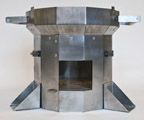


Over the next few months, TABL readers will see weekly articles on flu-related topics. The Berkeley Lab Pandemic Task Force recommended the increased communication after reviewing national statistics on patient visits for flu-like illness. Go here to view a graph depicting the proportion of visits to CDC-reporting clinics for flu-like illness. Each year for the past three years, incidents of seasonal flu have increased around the 10th week of the year — with the recent 2008 spike being the highest on the graph. For the past three weeks, the proportion of visits for flu-like illness has jumped dramatically, about 20 weeks earlier than expected for a normal flu season. The advent of novel H1N1 influenza this spring has disrupted normal seasonal patterns. It’s important for employees to have the best available information on how to protect themselves and their families from this early flu season. Visit the Lab's Pandemic Flu website for more information.
 Stimulus: Lab Gets $7 Million for Enhanced Geothermal Energy Technologies
Stimulus: Lab Gets $7 Million for Enhanced Geothermal Energy Technologies The Lab has been awarded $7 million in American Recovery and Reinvestment Act funding for four projects that seek to advance Enhanced Geothermal Systems (EGS), which is capable of harnessing the Earth’s heat where conventional geothermal technologies cannot. The funding is part of a $400 million investment that the Department of Energy has made in geothermal energy thanks to the Recovery Act. More>
 Research: Lab Prepare U.S. Climate Community for 100-Gigabit Data Transfers
Research: Lab Prepare U.S. Climate Community for 100-Gigabit Data Transfers As researchers around the world tackle the issue of global climate change, they are both generating and sharing increasingly large amounts of data. This increased collaboration helps climate scientists better understand what is happening and evaluate the effectiveness of possible mitigations. But sharing these increasingly large datasets requires reliable high-bandwidth networks. To help ensure that the climate research community has the resources necessary to access, transfer and analyze the data, the Department of Energy has funded several related projects at Berkeley Lab. More>
 [Reuters] The Berkeley, California-based Darfur Stoves Project (DSP), in partnership with Oxfam America and the Sudanese organization Sustainable Action Group (SAG), has launched an assembly facility for fuel-efficient stoves in El Fasher, the capital of the Darfur region. The assembly facility is the last stop on a global technology solution supply chain that starts with testing and design at Berkeley Lab and stops in a manufacturing facility outside of Mumbai, India before arriving, ultimately, for assembly in Darfur, Sudan. More>
[Reuters] The Berkeley, California-based Darfur Stoves Project (DSP), in partnership with Oxfam America and the Sudanese organization Sustainable Action Group (SAG), has launched an assembly facility for fuel-efficient stoves in El Fasher, the capital of the Darfur region. The assembly facility is the last stop on a global technology solution supply chain that starts with testing and design at Berkeley Lab and stops in a manufacturing facility outside of Mumbai, India before arriving, ultimately, for assembly in Darfur, Sudan. More>
 In Memoriam: Eloine (Ellie) Ralph
In Memoriam: Eloine (Ellie) Ralph Former Lab employee Ellie Ralph passed away on Oct. 1 from complications following an accidental fire in her home. She was 81 years old. Ralph worked at the Lab for 40 years, starting in 1951 and retiring in 1991. She started in the Mechanical Engineering Department’s Print Room and then became an assistant technical coordinator with the Liaison Group, work she continued until her retirement.
 Health and Wellness: November is American Diabetes Month
Health and Wellness: November is American Diabetes MonthThe Lab’s Health Care Facilitator wants to remind employees that November is American Diabetes Month. Diabetes occurs when the body does not produce or properly use insulin. Insulin is a hormone that is needed to convert sugar, starches and other food into energy for daily life. The cause of diabetes continues to be a mystery, although both genetics and environmental factors such as obesity and lack of exercise appear to play roles. Small changes in diet and exercise can prevent Type 2 diabetes from developing or slow its progress. More>
Today at Berkeley Lab is produced by Public Affairs' Communications Group